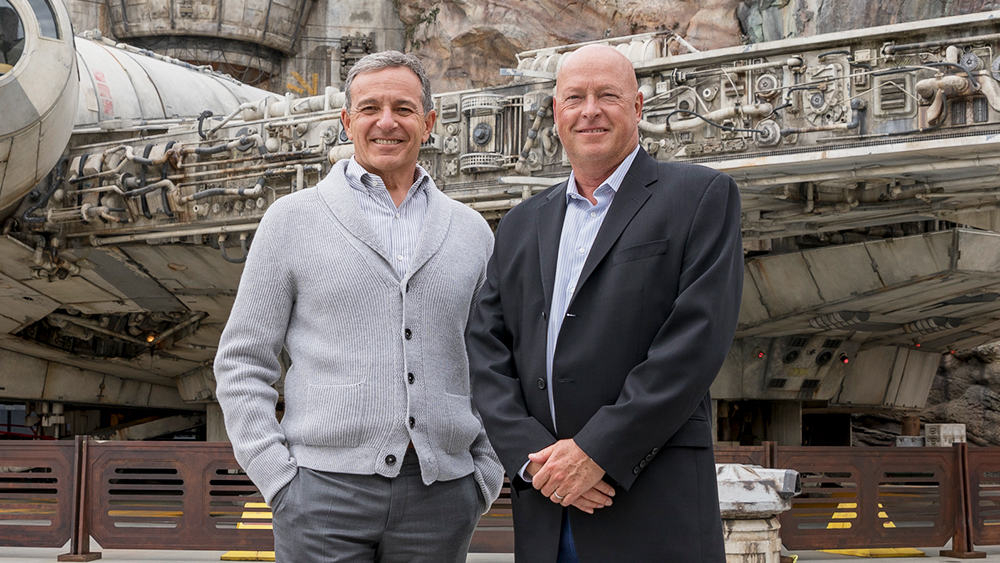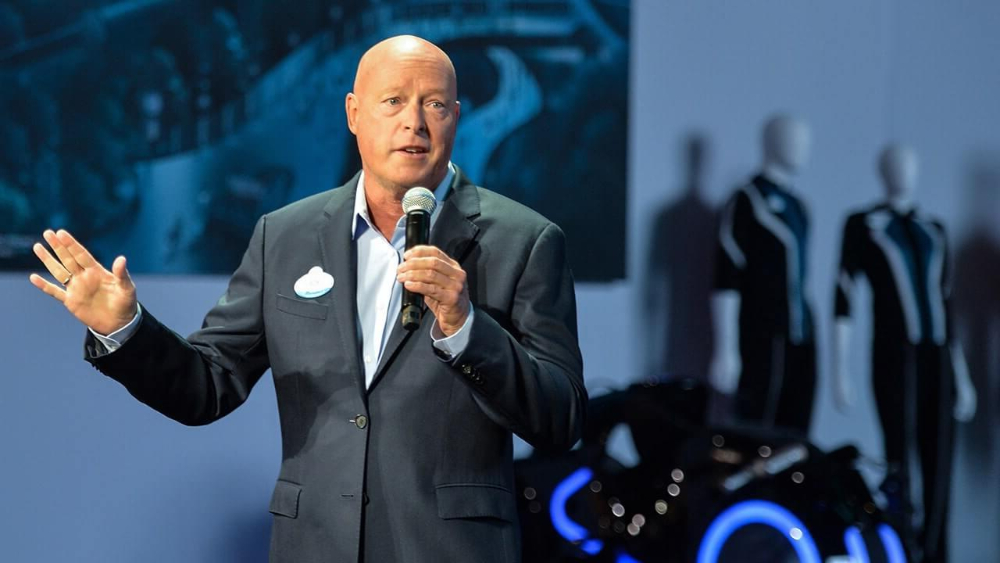
Bob Iger finally seems to have retired. For good this time… maybe. One can never be entirely sure about these things, as Iger was supposed to have retired three and a half years ago, and then again a year later, but as of this moment, he is no longer the Chairman of the Walt Disney Company.
During his 16-plus years at the helm of Disney, he turned a large corporation that was just one of the six major studios into an unrivaled powerhouse. Disney is no longer just Disney. It’s also Pixar and Marvel and Star Wars. It’s the entity that used to be 20th Century Fox, and is now, I guess, Fox Studios (a subsidiary of the Walt Disney Company). It is Disney Shanghai, it is Disney+, and it is first among equals.
All of that is Iger’s doing. He’s the one who put the purchases into play, acquiring each of those operations and spending years establishing a foothold for Disney’s theme park in China. He was the CEO for a decade and a half before becoming Chairman, and it’s not out of bounds to call him one of the best corporate leaders in the history of Hollywood. Sure, Netflix is technically larger, but I remain convinced that it is built, at least partially, on nothing more than sand, and that its continued growth has an endpoint. Disney’s success, however, is different. It is based on concrete matters like networks and production entities and theme parks and stores and licensing. The kinds of things that are far more diversified than subscriber numbers. If, someday in the not-too-distant future, we learn that Netflix’s value has plummeted because subscriber numbers have actually dropped, it won’t be a surprise.
Hearing such a thing about Disney, now that it’s a master of so many different domains, would be an enormous one. A cataclysmic one. Completely unthinkable. Again, this is because of Iger.
Don’t get me wrong, he wasn’t perfect. Harvey Weinstein’s reign of terror happened in part under his watch, as did John Lasseter’s eventual fall from grace. More than a few people put at least some of the blame for these things on Iger’s shoulders, and they have a point. It’s clear he put the bottom line and the company’s stock price ahead of certain personnel decisions, and he has to own that. Overall, though, it’s hard to dispute the success he had in his role, or how large Disney grew under his command.

But now, Iger is gone, and that means a new era must begin, this one under yet another Bob. Bob Chapek is 60 years old (Iger is 70) and he has spent the last three decades at Disney, where he’s had a series of jobs at which he was hugely successful. Chapek replaced Iger as CEO on February 25, 2020, and though he’s held the title since then, Disney was always going to be Iger’s company until he walked off the lot. Now, it’s Chapek’s, and that makes us wonder what new worlds there are for him to conquer.
Chapek’s run has come entirely under the cloud of COVID-19, which means he’s had to make some difficult decisions right from the start. That formidable list includes closing the theme parks and figuring out not just when to reopen them, but what kind of mask mandates would be in place, as well as navigating movie theater closures while expanding Disney’s nascent streaming service. To do this while the whole world was getting kicked in the teeth by a global pandemic is rather impressive, even more so when you consider that Chapek had to accomplish this in Iger’s estimable shadow.
But now he’s alone in the driver’s seat, which means that all the good and the bad that come next land on his shoulders. The growth of Disney+? That will be on Chapek, as will the continued success of the theme parks, company properties, and consumer products — parts of the Disney operation that he ran in the five years before his big promotion. In fact, while Chapek was running the Parks and Resorts division, he put $24 billion into it, which is more than Iger spent acquiring Marvel, Pixar, and Lucasfilm, combined (that number was between $15 billion and $16 billion). That’s not something most people know, because it’s not as flashy, but in the two years after Chapek poured that money into the division, profits from Parks and Resorts went up 14 percent.
Chapek’s success there made him Iger’s heir apparent, the next-in-line to the Disney throne. Given the many ways in which the entertainment business has changed of late, with diversification being a top priority, his ascent makes perfect sense. Now that Chapek has reached the top of the mountain, it begs the question of what he plans to do there.

As a studio, Disney still makes movies now and again, but mostly it exists as a distributor for its subsidiaries. In the coming year, there are roughly 30 films on the docket, but they are all Marvel, Lucasfilm, Pixar, Fox Studios, Searchlight, and Disney Animation. The days of Touchstone Pictures, Disney’s more mature live-action division, are long gone, as attention is paid to other areas.
While that’s not great for the theatrical release model, it’s not bad for Hollywood as a whole. Chapek wants to expand the reach of Disney+, and while placing more movie titles on the service should help — full disclosure, I first subscribed because Disney+ had all the Marvel movies on it, and I wanted to watch WandaVision, but then I stayed because, well, there’s a lot of good stuff on there — putting more and more TV shows on it works just as well. Because whether Disney+ focuses its efforts on producing movies or series, it all just blends into streaming content, and content is what gets people to subscribe and stay subscribed. It’s a lesson that Netflix learned a long time ago, and one that Amazon Prime is finally starting to understand.
From a below-the-line perspective, more content means more production, which means more work for everyone. Which is great! Of course, the fact that Chapek’s heart lies with the theme parks and resorts, stores, cruises, and so on, isn’t as great, but it’s clear that the man understands how important streaming is to Disney’s bottom line, and the way the company is perceived on Wall Street. Streaming is, after all, the future of content. If Disney becomes more of a 21st century TV network than a movie studio as a result of our mass migration to at-home entertainment, so be it.
For that very reason, Chapek is fortunate that Iger left him all these high-profile production entities, as Chapek can leave the movie-making to others, while ensuring the TV division grows and remains fortified by all the other things that make Disney, well, Disney.
It may be impossible for Chapek to fill Iger’s shoes, but I suspect that he’ll steer the Disney ship perfectly adequately, if unspectacularly. And give him credit for moving quickly to fix his biggest blunder — getting into a public war of words with Black Widow star Scarlett Johansson. The actress settled her suit with Disney and is developing a top-secret Marvel movie, as well as a Tower of Terror movie. Crisis averted… for now. But rest assured, with the pandemic still roaring, it’s going to be another long year for Disney’s top Bob.
 Neil Turitz is a journalist, essayist, author, and filmmaker who has worked in and written about Hollywood for nearly 25 years, though he has never lived there. These days, he splits his time between New York City and the Berkshires. He’s not on Twitter, but you can find him on Instagram @6wordreviews.
Neil Turitz is a journalist, essayist, author, and filmmaker who has worked in and written about Hollywood for nearly 25 years, though he has never lived there. These days, he splits his time between New York City and the Berkshires. He’s not on Twitter, but you can find him on Instagram @6wordreviews.
You can read a new installation of The Accidental Turitz every Wednesday, and all previous columns can be found here.
All pictures courtesy of the respective copyright owners.





